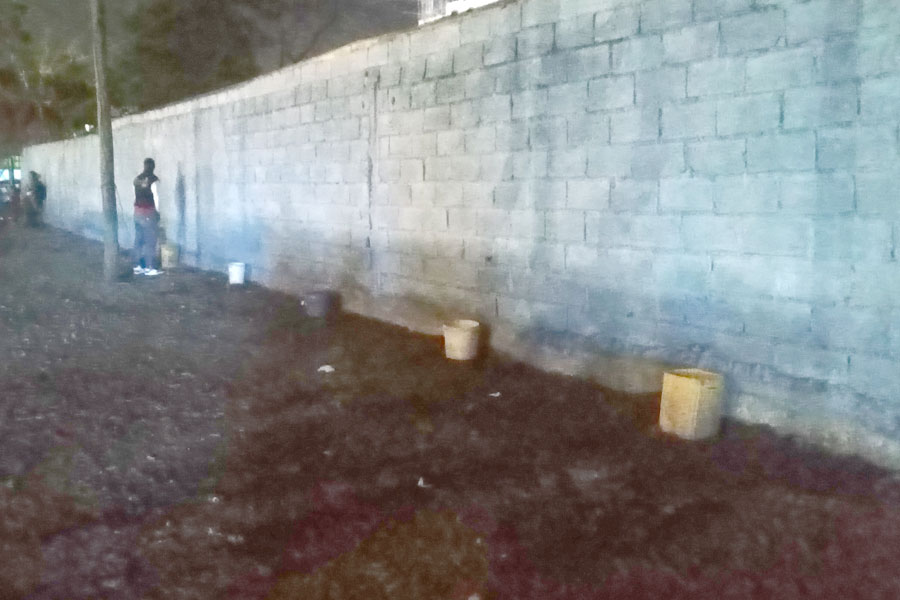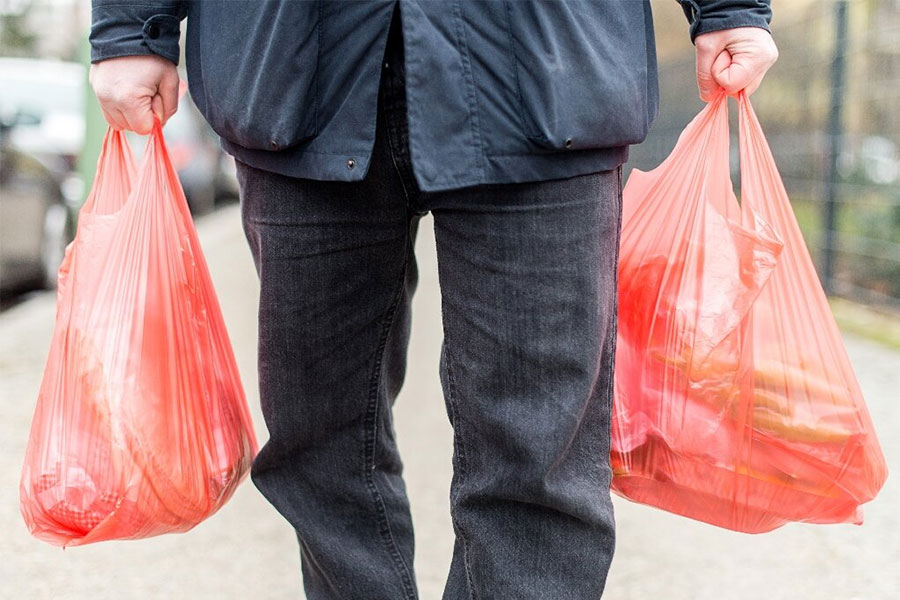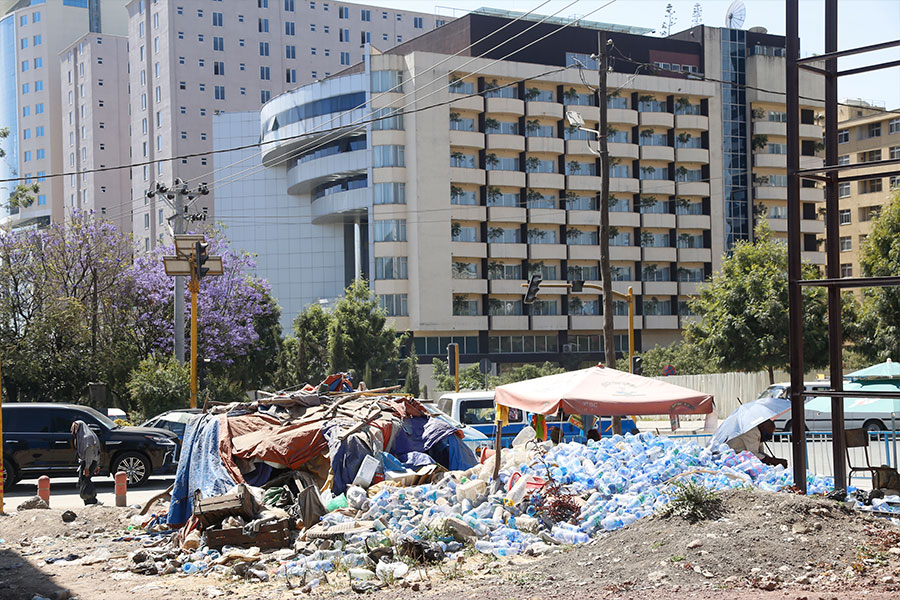
Fortune News | Jul 13,2020
Until not long ago, there were three garbage hot spots in our neighbourhood, safe havens for stray dogs. To any passerby, the mélange of thrown-out nappies, hair extensions, fake plastic flowers, toothbrushes, glasses, mirrors, and myriad cans and bones could be seen. Making the site, and the smell, all the more unbearable was the food waste, including the occasional culled head of a sheep or ox during the holidays.
If there is a dead cat or dog in the house, the motto of our neighbourhood was, “Throw it on the dump!”
One day, a couple of youngsters and I mustered the courage to make the hilly garbage dumpsters - despite the opinionated gazes of our neighbours - history.
To break the cycle, my house served as the neighbourhood dumpster for a very brief time. After the garbage heap was cleaned up, attempts to educate neighbours on the matter of collective sanitation were made, and some of the food waste began to be used as bird feed. Things have improved a great deal now.
As memorabilia of the feat, a few kids’ toys, broken bottles and glasses are left in my garden. But there is more drama in the neighbourhood to remind me of the old garbage piles.
Some days ago, there was a dispute between a neighbour and one of the waste collectors that come in the mornings. There was a great deal of emotion behind the disagreement as both spoke. It was not hard to understand why, especially from the perspective of the waste collector.
Every morning, they receive solid waste-filled bags from each household, which they then load into trucks to drive to a garbage landfill. Unfortunately, once the garbage bags have been taken out and before the trucks could get to them, small kids, stray dogs and even the occasional strong wind follow.
What is left is an utter clutter hard to collect. Sorting it is a hazardous and tiring process that is entirely unfair to the waste collectors. This was what the argument was about and all that these youth were asking was for the residents to keep an eye on the garbage bags until they were picked up by the trucks.
But emotions were high on both sides. No solution was arrived at, and no apologies were offered. The youngster left with the bag.
This was nothing other than a story of the inhabitants of the city and how we handle our waste and, by extension, how we relate to those that carry out this important task for very little pay. From biological contaminants to the sharp objects we chuck nonchalantly into waste bags, we treat these workers appallingly, considering the kind of risks we expose them to.
The most frustrating part is that we could alleviate the problem at a tiny expense to ourselves. This could be as simple as giving a moment's thought to what is recyclable and what is not and sorting them in waste bags accordingly. Wasting the refuse after it has been dumped into the same bag causes the collectors to expend a great deal of energy to go through it, not to mention exposing them to disease.
Littering is another great offence that is carried out often because of pure negligence and ignorance. Though it is tantamount to an outrageous act in the developed world these days, it seems to be completely acceptable to turn available public spaces into dumpsters. This is an act that many fulfill on a daily basis, despite the fact that it takes minimum energy to hold onto whatever we are about to throw away until we find the appropriate receptacle.
No doubt, people have the capacity to learn and mend their ways as they see the ill they are causing the environment and their own health. People will become more interested in collecting small amounts of waste when they receive information not only about the environmental and public health benefits.
If there is one thing that has been made evident to many people by the Novel Coronavirus (COVID-19) pandemic, it is that sanitation goes a long way in addressing public health hazards. Indeed, there have been several campaigns by the government and international organisations to create greater public awareness of COVID-19. What remains now is to connect positive overall public health outcomes to urban pollutants such as littering.
Just as imperative is to extend sympathy and gratitude to those that work in waste collection. The least that can be done at the moment is to protect these public servants through the provision of improved protective gear with the goal of protecting them from long-term health consequences.
No city is without waste. The more development there is, the more of it there will be. It is thus incumbent upon the beneficiaries of this growth to pay heed to the importance of efficient waste collection and the harsh conditions those in waste disposal are exposed to.
PUBLISHED ON
Oct 10,2020 [ VOL
21 , NO
1067]


Fortune News | Jul 13,2020

Agenda | Feb 03,2024

Fortune News | Mar 23,2019

Radar | Jun 05,2021

Radar | Jun 07,2025

Sunday with Eden | Jul 20,2024

Fortune News | Mar 09,2020

Radar | Dec 19,2020

Radar | Jan 12,2019

Viewpoints | Jun 07,2020

Dec 22 , 2024 . By TIZITA SHEWAFERAW
Charged with transforming colossal state-owned enterprises into modern and competitiv...

Aug 18 , 2024 . By AKSAH ITALO
Although predictable Yonas Zerihun's job in the ride-hailing service is not immune to...

Jul 28 , 2024 . By TIZITA SHEWAFERAW
Unhabitual, perhaps too many, Samuel Gebreyohannes, 38, used to occasionally enjoy a couple of beers at breakfast. However, he recently swit...

Jul 13 , 2024 . By AKSAH ITALO
Investors who rely on tractors, trucks, and field vehicles for commuting, transporting commodities, and f...

Jun 28 , 2025
Meseret Damtie, the assertive auditor general, has never been shy about naming names...

Jun 21 , 2025
A well-worn adage says, “Budget is not destiny, but it is direction.” Examining t...

Jun 14 , 2025
Yet again, the Horn of Africa is bracing for trouble. A region already frayed by wars...

Jun 7 , 2025
Few promises shine brighter in Addis Abeba than the pledge of a roof for every family...